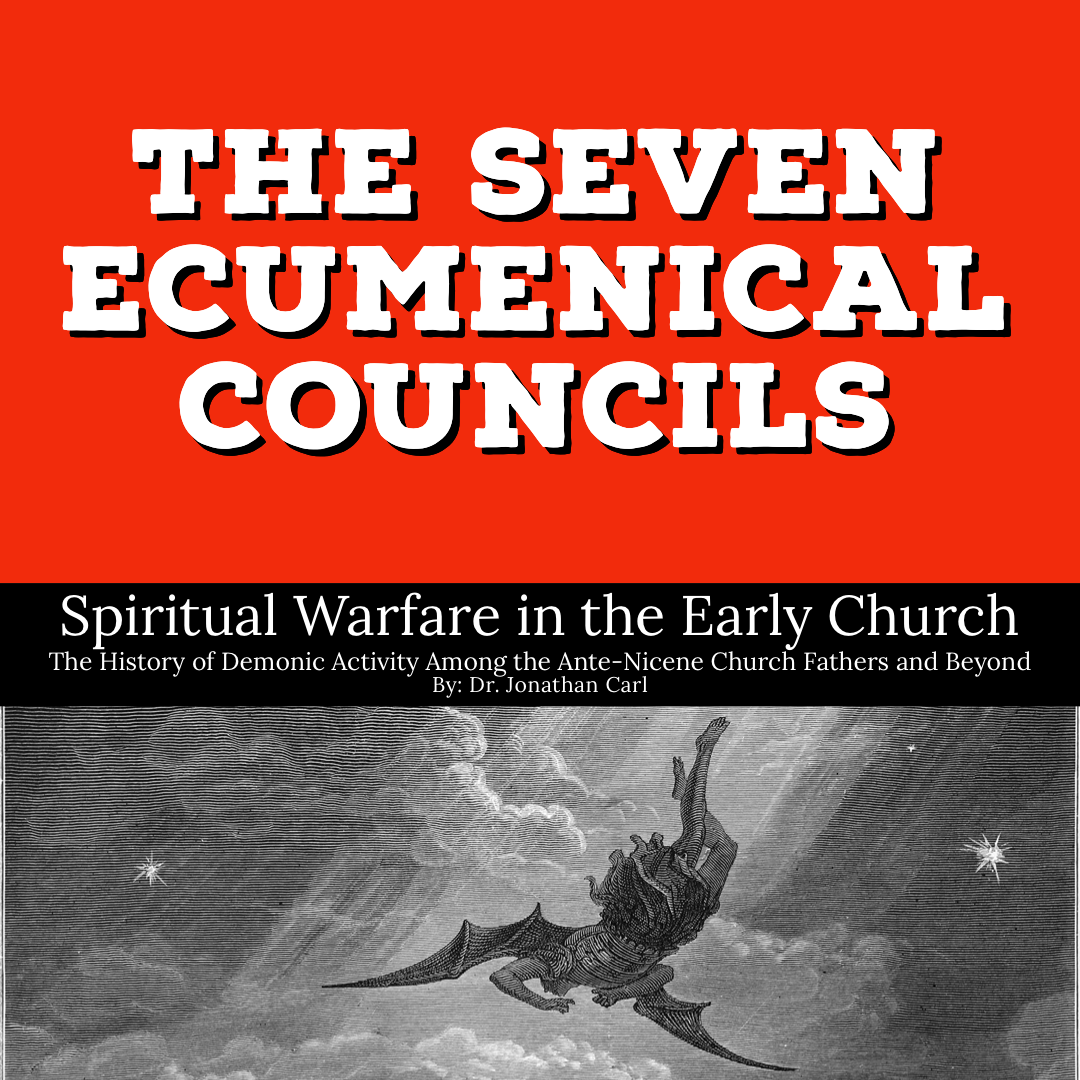THE SEVEN ECUMENICAL COUNCILS
In addition to looking at the early church fathers for insight into their understanding of the theology and practice of spiritual warfare, one can also look to early church doctrine. This doctrine is often best seen through the first seven ecumenical councils: First Council of Nicaea (AD 325), First Council of Constantinople (AD 381), Council of Ephesus (AD 431), Council of Chalcedon (AD 451), Second Council of Constantinople (AD 553), Third Council of Constantinople (AD 680), and Second Council of Nicaea (AD 787).
The Canons of the Holy and Altogether August Apostles is a collection of early church law, most of which are prior to AD 300. In one of these early canons, a prohibition is given against clergymen with “devils.”[1] At the Synod of Laodicea (AD 363), there is a prohibition given against the clergy and priesthood practicing magic, enchantment, astrology, or math. Clergy are also prohibited from making “what are called amulets, which are chains for their own souls.”[2] The Canons of the Two Hundred Holy and Blessed Fathers Who Met at Ephesus (AD 431) describe and condemn a Messalian sect that believed “that everyone inherited from his ancestors a demon.”[3] The Canons of the Council of Orange (AD 529) addressed the controversy between Augustine and Pelagius in salvation. In its seventh canon, they assert that a false understanding of agency in salvation occurs when one “is led astray by a heretical spirit.”[4]
At the fifth ecumenical council, The Second Council of Constantinople (AD 553), Origen is anathematized regarding some of his particular views regarding demons.[5] A continuation of the Sixth Ecumenical Council, The Canons of the Council in Trullo, met in approximately AD 691. One of their canons describes the punishment of those who feign demonic possessions and manifestations, stating that “they should be subjected to afflictions and hardships of the same kind as those to which they who are truly demoniacally possessed.”[6] A 12th century commentator on this canon, John Zonaras, says that even in his day people made the same claim to demonic possession.[7] An additional canon from Trullo states that those “who tell fortunes and fates, and genealogy . . . those who are called expellers of clouds, enchanters, amulet-givers, and soothsayers” should be thrown out of the church.[8]
TheEpitome of the Definition of the Iconoclastic Conciliabulum held in Constantinople (AD 754) represented that the introduction of icon worship through the pictures of the Saints was “introduced by the devil” and was not to be followed.[9]In the seventh ecumenical council at the Second Council of Nicaea (AD 787), bishop Basil of Ancyra asks to be restored to fellowship while resisting future “fraud of the devil.”[10]He mentions the “grace” bestowed by the Apostles and Fathers “even down to us today” for “the healing of diseases and the curing of sicknesses and the casting out of devils.”[11]
[1]“If anyone has a devil, let him not be made a clergyman, neither let him pray with the faithful; but if he be freed, let him be received into communion, and if he is worthy he may be ordained.” The Canons of the Holy and Altogether August Apostles (NPNF2 14:594), accessed December 30, 2013, http://www.ccel.org/ccel/schaff/npnf214.xvii.iv.html.
[2]“The Anathematisms of Emporer Justinian Against Origen . . . V. If anyone shall say that a psychic (ψυχικὴν) condition has come from an angelic or archangelic state, and moreover that a demoniac and a human condition has come from a psychic condition, and that from a human state they may become again angels and demons, and that each order of heavenly virtues is either all from those below or from those above, or from those above and below: let him be anathema. . . . VI. If anyone shall say that there is a twofold race of demons, of which the one includes the souls of men and the other the superior spirits who fell to this . . . VII. If anyone says or thinks that Christ the Lord in a future time will be crucified for demons as he was for men, let him be anathema. . . . IX. If anyone says or thinks that the punishment of demons and of impious men is only temporary, and will one day have an end, and that a restoration (ἀποκατάστασις) will take place of demons and of impious men, let him be anathema.” The Canons of the Synod Held in the City of Laodicea, in Phrygia Pacatiana, in which Many Blessed Fathers from Divers Provinces of Asia Were Gathered Together (NPNF2 14:151), accessed December 30, 2013, http://www.ccel.org/ccel/schaff/npnf214.viii.vii.iii.xli.html.
[3]Note on the Messalians or Massalians (NPNF2 14:241), accessed December 30, 2013, http://www.ccel.org/ccel/schaff/npnf214.x.xvi.xvi.html.
[4]Canons of the Council of Orange, Bible Study Tools, accessed December 30, 2013, http://www.biblestudytools.com/history/creeds-confessions/creeds/canons-of-the-council-of-orange.html.
[5]The Anathematisms of the Emperor Justinian Against Origen (NPNF2 14:320), accessed December 30, 2013, http://www.ccel.org/ccel/schaff/npnf214.xii.x.html.
[6]The Canons of the Council in Trullo (NPNF2 14:392), accessed December 30, 2013, http://www.ccel.org/ccel/schaff/npnf214.xiv.iii.lxi.html.
[7]John Zonaras, “Ancient Epitome of Canon LX in The Canons of the Council in Trullo” (NPNF2 14:392), accessed December 30, 2013, http://www.ccel.org/ccel/schaff/npnf214.xiv.iii.lxi.html.
[8]The Canons of the Council in Trullo (NPNF2 14:393).
[9]The Epitome of the Definition of the Iconoclastic Conciliabulum held in Constantinople (A.D. 754) (NPNF2 14:543), accessed December 30, 2013, http://www.ccel.org/ccel/schaff/ npnf214.xvi.x.html.
[10]The Seventh Ecumenical Council. The Second Council of Nice. Extracts from the Acts (NPNF2 14:533), accessed December 30, 2013, http://www.ccel.org/ccel/schaff/npnf214.xvi.v.html.
[11]Ibid.
